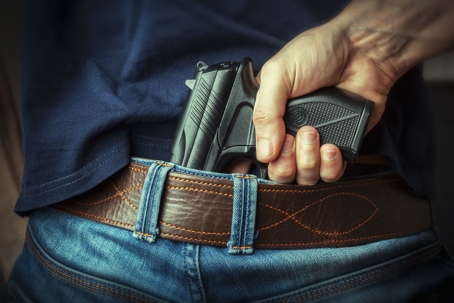North Carolina closely regulates the carrying of concealed weapons by the public. NCGS 14-269 prohibits the carrying of deadly weapons, except as provided in the statute. One of the most important exceptions to this law is when someone has a concealed handgun permit. A concealed handgun permit can be obtained from your local sheriff after undertaking a training course, qualifying with a firearm, and passing a background and mental health check performed by the sheriff. It is important to note that if you are carrying a handgun and you are permitted to do so, there are some extra requirements that you have to undertake when interacting with law enforcement. Finally, a North Carolina concealed handgun permit only allows you to conceal handguns not any other forms of deadly weapons.
When someone is charged with the crime of carrying a concealed weapon, two issues must be addressed;
- Was the weapon the person was carrying a deadly weapon?
- Was the weapon concealed?
ISSUE 1. Was the weapon a deadly weapon?
A deadly weapon in North Carolina is one that is likely to produce death or great bodily harm, under the circumstances of its use. State v. Parker 7 N.C. App. 191 (1977). The statute does specifically list certain weapons; bowie knives, daggers, dirks, stun guns, pistols, and other firearms, for example. But the statute also includes the blanket language, “or other deadly weapon of like kind,” this prohibition extends the list to include any deadly weapon. This does not mean that the use of the item in question must guarantee an outcome of death or great bodily harm, therefore, there are several weapons that many people believe to be “non-lethal” or “less than lethal” force which would still be covered by this statute. Furthermore, there are some weapons that have been exempted from this statute by the courts, an ordinary sized knife carried in the pocket or purse, in which the blade is completely housed within the body and is not a switchblade or projectile knife, does not count towards a deadly weapon for purposes of this charge.
It is important to note that a firearm will always be considered a deadly weapon for purposes of this charge. Meanwhile, BB guns, air rifles, and pellet guns, while not directly considered to be firearms by statute, are also often considered deadly weapons by the court system.
ISSUE 2. Was the weapon concealed?
North Carolina is a traditional open carry state, meaning that if the weapon is carried openly then there is no violation of this statute. State v. Mangum 187 N.C. App. 477 (1924). So what does it mean to be concealed? North Carolina courts have been inconsistent in this decision. They have ruled that if the weapon is partly visible or readily identifiable, then it is not concealed. However, they have also ruled that a pistol sticking out of the defendant’s pocket was a concealed weapon.
Another important consideration is the location of the weapon in question. The court has found that in order to be in violation of NCGS 14-269, the weapon must be concealed on or about the person of the defendant. North Carolina courts have found that this phrase means that the weapon must be within easy reach and control of the defendant, such that prompt use is possible.
Therefore, when transporting weapons, it is important to keep the following things in mind. First, what kind of weapon are you transporting? Could the weapon in your possession be considered a deadly weapon? Second, what state the weapon is in is also important; remember an unloaded firearm will always be looked at differently than a loaded firearm. Finally, and most importantly, location. If you do not have a concealed carry permit, the further from you the weapon is, the better.
If you have any questions about carrying a concealed weapon, or you have been charged with this offense please contact one of the criminal defense attorneys at Jetton & Meredith. Our attorneys have the knowledge and expertise to help you protect your rights.

